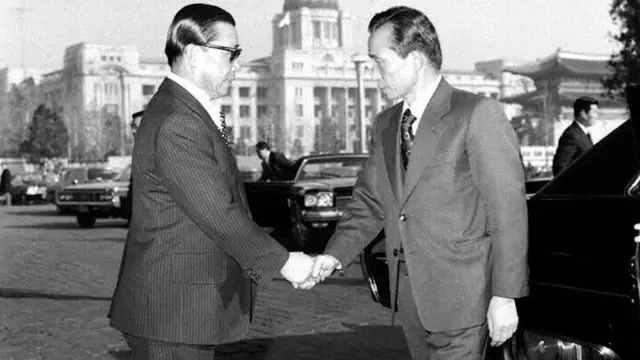South Korea Reopens Case Against Spy Chief Linked to Assassination of Park

Two gunshots marked a pivotal moment in South Korean history on the evening of October 26, 1979, when President Park Chung-hee was assassinated by his close associate, Kim Jae-gyu. This shocking event ended Park’s nearly two-decade-long authoritarian rule and set off a chain of political upheaval in the country. As South Korea reflects on this historical incident, a retrial for Kim Jae-gyu is underway, raising questions about his motives and the legacy of both the assassin and the president he killed.
The Night of the Assassination
Yoo Seok-sul, a former security guard for the Korea Central Intelligence Agency (KCIA), vividly recalls the fateful night when Park was shot. At approximately 7:40 PM, while resting in the break room of the KCIA’s “safe house,” Yoo heard the first gunshots. He described the atmosphere as tense, with guards waiting outside for orders while the president’s security detail remained inside. After the initial chaos, Yoo’s supervisor instructed him to bury evidence, including two guns and bullets, in the garden. Unbeknownst to him, these weapons were used in the assassination of Park, who had ruled South Korea for 18 years. The shooter, Kim Jae-gyu, was a long-time friend of Park and head of the KCIA, a key institution in Park’s regime. The assassination shocked the nation, leading to Kim’s execution for insurrection and the end of Park’s oppressive rule.
The Legacy of Park Chung-hee and Kim Jae-gyu
Park Chung-hee’s legacy remains contentious in South Korea. While some credit him with significant economic growth, others condemn his authoritarian governance. Kim Jae-gyu, on the other hand, is viewed as a polarizing figure; some see him as a traitor, while others regard him as a patriot who acted to prevent further bloodshed. The retrial, initiated by Kim’s family, aims to challenge the narrative that he was a traitor. The case has gained renewed attention, especially as South Korea grapples with its democratic values in light of recent political events, including the trial of impeached President Yoon Suk Yeol for similar charges of insurrection.
The Court Proceedings and Public Reaction
The retrial of Kim Jae-gyu has sparked widespread debate about the nature of his actions and the circumstances surrounding the assassination. During the original trial, Kim was convicted of attempting to seize power through murder, a charge that many believe was influenced by the political climate of the time. His sister, Kim Jung-sook, has been a vocal advocate for her brother, asserting that he acted out of a sense of duty to protect the nation from Park’s increasingly oppressive rule. The current proceedings are examining the validity of the original trial, including allegations of torture during Kim’s interrogation and the lack of substantial evidence against him.
Reflections on Democracy and Historical Context
As South Korea revisits this critical moment in its history, the retrial serves as a reflection on the country’s democratic journey. The assassination of Park Chung-hee and the subsequent actions of Kim Jae-gyu have become symbols of the struggle between authoritarianism and democracy. Legal experts argue that the retrial could redefine how both figures are perceived in the context of South Korea’s political evolution. With the nation still grappling with the implications of past authoritarian rule, the outcome of this retrial may influence public sentiment and the ongoing discourse about democracy in South Korea.
Observer Voice is the one stop site for National, International news, Sports, Editor’s Choice, Art/culture contents, Quotes and much more. We also cover historical contents. Historical contents includes World History, Indian History, and what happened today. The website also covers Entertainment across the India and World.
Follow Us on Twitter, Instagram, Facebook, & LinkedIn

